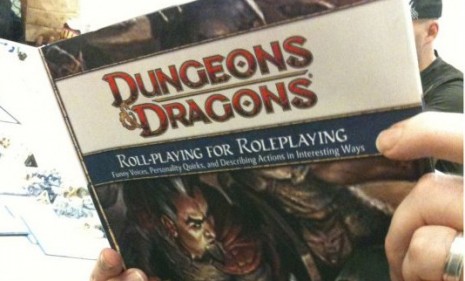'Dungeons and Dragons': A new middle-age craze?
Salon's Ethan Gilsdorf says he has rediscovered the role-playing game — and plenty of other 40-somethings are rolling their 20-sided dice again, too

A free daily email with the biggest news stories of the day – and the best features from TheWeek.com
You are now subscribed
Your newsletter sign-up was successful
Dungeons & Dragons, the Reagan-era role-playing game, is enjoying a renaissance of sorts. In fact, says Ethan Gilsdorf at Salon, some 25 years after its heyday, "the game has finally come into its own as a powerful cultural force." Since its creation in 1974, the game has been "instrumental" in the way sci-fi spreads through pop culture. And the "geeks" who grew up with the game now create the movies, television, music, and video games we all consume. Now, plenty of parents are "re-geeking" themselves, and reintegrating the game of their youth. Here, an excerpt:
Pure and simple, for many, D&D represents a lost age: It was an individualized, user-driven, DIY, human-scaled creative space separate from the world of adults and the intrusion of corporate forces. ... D&D recalls that day "before orcs and wookies were the intellectual property of vast transmedia corporations." Back when you had lots more free time than money — before girlfriends, job, kids. Life.
But by playing RPGs (role-playing games) … I also learned to be confident and decisive, and to feel powerful. Even to feel cocky. Some of the guts and nerve I role-played began to leak into the real world. By the time I graduated high school, I had transformed. I had used escapist fantasy to gather strength for later, when I was ready to come out of my shell. In this sense, the wave of nostalgia I've felt also springs from a desire to pay tribute to D&D. To thank the game for the gifts of creativity and self-actualization it bestowed upon us.
The Week
Escape your echo chamber. Get the facts behind the news, plus analysis from multiple perspectives.

Sign up for The Week's Free Newsletters
From our morning news briefing to a weekly Good News Newsletter, get the best of The Week delivered directly to your inbox.
From our morning news briefing to a weekly Good News Newsletter, get the best of The Week delivered directly to your inbox.
Read the entire article in Salon.
A free daily email with the biggest news stories of the day – and the best features from TheWeek.com
-
 ‘Those rights don’t exist to protect criminals’
‘Those rights don’t exist to protect criminals’Instant Opinion Opinion, comment and editorials of the day
-
 Key Bangladesh election returns old guard to power
Key Bangladesh election returns old guard to powerSpeed Read The Bangladesh Nationalist Party claimed a decisive victory
-
 Judge blocks Hegseth from punishing Kelly over video
Judge blocks Hegseth from punishing Kelly over videoSpeed Read Defense Secretary Pete Hegseth pushed for the senator to be demoted over a video in which he reminds military officials they should refuse illegal orders